
December 24, 2024
Life Story of Famous People
Short Bio » Politician » Abraham Lincoln


Abraham Lincoln
Abraham Lincoln was the 16th President of the United States of America. He is regarded by many as the most influential president of America. He is known for abolishing slavery from the united states. Lincoln led the nation through the American Civil War, the country’s greatest moral, constitutional, and political crisis. Abraham Lincoln was in office as president from March 4, 1861, to April 15, 1865. John Wilkes Booth assassinated Abraham Lincoln on April 15, 1965.

Early Life:
Abraham Lincoln was born on February 12, 1809, in Hodgenville, Kentucky. He was the second son of Thomas and Nancy Lincoln. He was born into a poor family. His mother died when he was nine years old. He self-educated himself into a lawyer. in 1842, Abraham Lincoln married Mary Todd. They married at Springfield, Illinois. Abraham Lincoln was elected to the U.S. House of Representatives in 1846. He was a member of the Republican party. He started his fight against slavery at the time. He spoke against the Mexican-American War. He served a two-year term as a congressman. After that, he returned to being a lawyer. He again returned to politics only to abolish slavery for good. On November 6, 1860, Abraham Lincoln was elected the 16th president of the United States. He defeated Democrat Stephen A. Douglas, John C. Breckinridge of the Southern Democrats and John Bell of the new Constitutional Union Party. He became the first president of United States from The Republican Party. The American Civil War broke out in 1861. The slave states defected from the United States and declared a war of Abraham Lincoln’s America. He was re-elected as president in 1864 during the war. Abraham Lincoln led the United States to victory in 1865.
A well-known actor John Wilkes Booth assassinated President Abraham Lincoln on April 15, 1865. He was the first American president to be assassinated. James A. Garfield, William McKinley and John F. Kennedy were assassinated after him. Abraham Lincoln was shot while watching the play Our American Cousin. He was with his wife Mary Todd Lincoln at Ford’s Theatre in Washington, D.C. The died the next morning. His tomb is located at Oak Ridge Cemetery in Springfield.
The Lincoln Memorial in Washington DC was built-in Abraham Lincoln’s honor. It holds a colossal statue of Abraham Lincoln sitting in an armchair. The late precedent has been included in a lot of modern-day fiction in Hollywood. Many successful biographical books and movies have been made on Abraham Lincoln. The five-dollar bills have his portrait embedded.
More Info: Wiki | WhiteHouse
Fans Also Viewed

Published in Politician and President

More Celebrities
- Skip to global NPS navigation
- Skip to this park navigation
- Skip to the main content
- Skip to this park information section
- Skip to the footer section

Exiting nps.gov
Alerts in effect, abraham lincoln autobiography.
Last updated: December 31, 2022
Park footer
Contact info, mailing address:.
2995 Lincoln Farm Road Hodgenville, KY 42748
270 358-3137
Stay Connected
- Project Gutenberg
- 74,798 free eBooks
- 3 by John G. Nicolay
A Short Life of Abraham Lincoln by John G. Nicolay

Read now or download (free!)
Similar books, about this ebook.
- Privacy policy
- About Project Gutenberg
- Terms of Use
- Contact Information

Help inform the discussion
- X (Twitter)

Abraham Lincoln: Life in Brief
When Abraham Lincoln was elected President in 1860, seven slave states left the Union to form the Confederate States of America, and four more joined when hostilities began between the North and South. A bloody civil war then engulfed the nation as Lincoln vowed to preserve the Union, enforce the laws of the United States, and end the secession. The war lasted for more than four years with a staggering loss of more than 600,000 Americans dead. Midway through the war, Lincoln issued the Emancipation Proclamation, which freed all slaves within the Confederacy and changed the war from a battle to preserve the Union into a battle for freedom. He was the first Republican President, and Union victory ended forever the claim that state sovereignty superseded federal authority. Killed by an assassin's bullet less than a week after the surrender of Confederate forces, Lincoln left the nation a more perfect Union and thereby earned the admiration of most Americans as the country's greatest President.
Born dirt-poor in a log cabin in Kentucky in 1809, Lincoln grew up in frontier Kentucky and Indiana, where he was largely self-educated, with a taste for jokes, hard work, and books. He served for a time as a soldier in the Black Hawk War, taught himself law, and held a seat in the Illinois state legislature as a Whig politician in the 1830s and 1840s. From state politics, he moved to the U.S. House of Representatives in 1847, where he voiced his opposition to the U.S. war with Mexico. In the mid-1850s, Lincoln left the Whig Party to join the new Republican Party. In 1858, he went up against one of the most popular politicians in the nation, Senator Stephen Douglas, in a contest for the U.S. Senate. Lincoln lost that election, but his spectacular performance against Douglas in a series of nationally covered debates made him a contender for the 1860 Republican presidential nomination.
Fighting for Unity and Freedom
In the 1860 campaign for President, Lincoln firmly expressed his opposition to slavery and his determination to limit the expansion of slavery westward into the new territories acquired from Mexico in 1850. His election victory created a crisis for the nation, as many Southern Democrats feared that it would just be a matter of time before Lincoln would move to kill slavery in the South. Rather than face a future in which black people might become free citizens, much of the white South supported secession. This reasoning was based upon the doctrine of states' rights, which placed ultimate sovereignty with the states.
Lincoln vowed to preserve the Union even if it meant war. He eventually raised an army and navy of nearly three million Northern men to face a Southern army of more than two million soldiers. In battles fought from Virginia to California (but mainly in Virginia, in the Mississippi River Valley, and along the border states) a great civil war tore the United States apart. In pursuing victory, Lincoln assumed extralegal powers over the press, declared martial law in areas where no military action justified it, quelled draft riots with armed soldiers, and drafted soldiers to fight for the Union cause. No President in history had ever exerted so much executive authority, but he did so not for personal power but in order to preserve the Union. In 1864, as an example of his limited personal ambitions, Lincoln refused to call off national elections, preferring to hold the election even if he lost the vote rather than destroy the democratic basis upon which he rested his authority. With the electoral support of Union soldiers, many of whom were given short leaves to return home to vote, and thanks to the spectacular victory of Union troops in General Sherman's capture of Atlanta, Lincoln was decisively reelected.
What started as a war to preserve the Union and vindicate democracy became a battle for freedom and a war to end slavery when Lincoln issued the Emancipation Proclamation in January of 1863. Although the Proclamation did not free all slaves in the nation—indeed, no slaves outside of the Confederacy were affected by the Proclamation—it was an important symbolic gesture that identified the Union with freedom and the death of slavery. As part of the Proclamation, Lincoln also urged black males to join the Union forces as soldiers and sailors. By the end of the war, nearly two hundred thousand African Americans had fought for the Union cause, and Lincoln referred to them as indispensable in ensuring Union victory.
Personal Tragedies and Triumphs
While the war raged, Lincoln also suffered great personal anguish over the death of his beloved son and the depressed mental condition of his wife, Mary. The pain of war and personal loss affected him deeply, and he often expressed his anguish by turning to humor and by speaking eloquently about the meaning of the great war which raged across the land. His Gettysburg Address, delivered after the Battle of Gettysburg, as well as his second inaugural in 1865, are acknowledged to be among the great orations in American history.
Almost all historians judge Lincoln as the greatest President in American history because of the way he exercised leadership during the war and because of the impact of that leadership on the moral and political character of the nation. He conceived of his presidential role as unique under the Constitution in times of crisis. Lincoln was convinced that within the branches of government, the presidency alone was empowered not only to uphold the Constitution, but also to preserve, protect, and defend it. In the end, however, Lincoln is measured by his most lasting accomplishments: the preservation of the Union, the vindication of democracy, and the death of slavery—accomplishments achieved by acting "with malice towards none" in the pursuit of a more perfect and equal union.
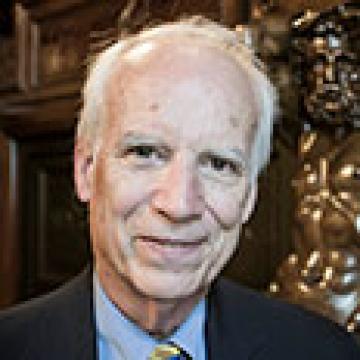
Michael Burlingame
Professor Emeritus of History Connecticut College
More Resources
Abraham lincoln presidency page, abraham lincoln essays, life in brief (current essay), life before the presidency, campaigns and elections, domestic affairs, foreign affairs, death of the president, family life, the american franchise, impact and legacy.
Biography Online

Abraham Lincoln Biography | Quotes | Facts
“With malice toward none; with charity for all; with firmness in the right, as God gives us to see the right, let us strive on to finish the work we are in; to bind up the nation’s wounds…. ”
– Abraham Lincoln
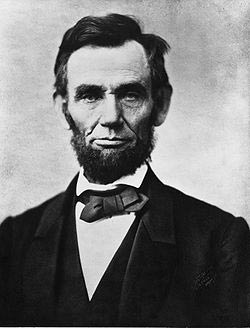
“If I were two-faced, would I be wearing this one?”
Work colleagues and friends noted that Lincoln had a capacity to defuse tense and argumentative situations, though the use of humour and his capacity to take an optimistic view of human nature. He loved to tell stories to illustrate a serious point through the use of humour and parables.
Lincoln was shy around women but after a difficult courtship, he married Mary Todd in 1842. Mary Todd shared many of her husband’s political thinking but they also had different temperaments – with Mary more prone to swings in her emotions. They had four children, who Lincoln was devoted to. Although three died before reaching maturity – which caused much grief to both parents.
As a lawyer, Abraham developed a capacity for quick thinking and oratory. His interest in public issues encouraged him to stand for public office. In 1847, he was elected to the House of Representatives for Illinois and served from 1847-49. During his period in Congress, Lincoln criticised President Folk’s handling of the American-Mexican War, arguing Polk used patriotism and military glory to defend the unjust action of taking Mexican territory. However, Lincoln’s stance was politically unpopular and he was not re-elected.
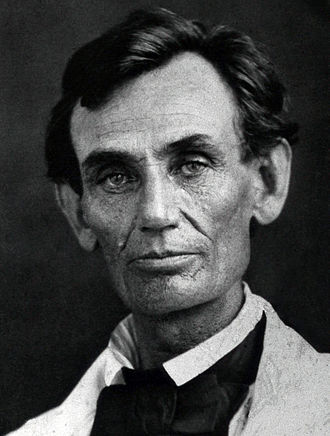
He gave influential speeches, which drew on the Declaration of Independence to prove the Founding Fathers had intended to stop the spread of slavery. In particular, Lincoln used a novel argument that although society was a long way from equality, America should aspire towards the lofty statement in the Declaration of Independence.
“We hold these truths to be self-evident: That all men are created equal”
Lincoln had a strong capacity for empathy. He would try to see problems from everyone’s point of view – including southern slaveholders. He used this concept of empathy to speak against slavery.
“I have always thought that all men should be free; but if any should be slaves, it should be first those who desire it for themselves, and secondly, those who desire it for others. When I hear anyone arguing for slavery, I feel a strong impulse to see it tried on him personally.”
Lincoln’s speeches were notable because they drew on both legal precedents but also easy to understand parables, which struck a chord with the public.
In 1858, Lincoln was nominated as Republican candidate for the Senate. He undertook a series of high-profile debates with the Democratic incumbent Stephen Douglass. Douglass was in favour of allowing the extension of slavery – if citizens voted for it. Lincoln opposed the extension of slavery. During this campaign, he gave one of his best-remembered speeches, which reflected on the divisive nature of America.
“A house divided against itself cannot stand. I believe this government cannot endure, permanently, half slave and half free. I do not expect the Union to be dissolved — I do not expect the house to fall — but I do expect it will cease to be divided. It will become all one thing or all the other. ” ( House Divided )
In this House Divided speech, Lincoln gave a prophetic utterance to the potential for slavery to divide the nation.
Although he lost this 1858 Senate election, his debating skills and oratory caused him to become well known within the Republican party.
On February 27, 1860. Lincoln was also invited to give a notable address at Cooper Union in New York. The East Coast was relatively new territory for Lincoln; many in the audience thought his appearance awkward and even ugly, but his calls for moral clarity over the wrongness of slavery struck a chord with his East coast audience.
“Let us have faith that right makes might, and in that faith, let us, to the end, dare to do our duty as we understand it.” (Cooper Union address)
The reputation he gained on the campaign trail and speeches on the East coast caused him to be put forward as a candidate for the Republican nominee for President in 1860. Lincoln was an outsider because he had much less experience than other leading candidates such as Steward, Bates and Chase, but after finishing second on the first ballot he went on to become unexpectedly nominated.
After a hard-fought, divisive campaign of 1860, Lincoln was elected the first Republican President of the United States. Lincoln’s support came entirely from the North and West of the country. The south strongly disagreed with Lincoln’s position on slavery
The election of Lincoln as President in 1861, sparked the South to secede from the North. Southern independence sentiment had been growing for many years, and the election of a president opposed to slavery was the final straw. However, Lincoln resolutely opposed the breakaway of the South, and this led to the American civil war with Lincoln committed to preserving the Union.
Lincoln surprised many by including in his cabinet the main rivals from the 1860 Republican campaign. It demonstrated Lincoln’s willingness and ability to work with people of different political and personal approaches. This helped to keep the Republican party together.
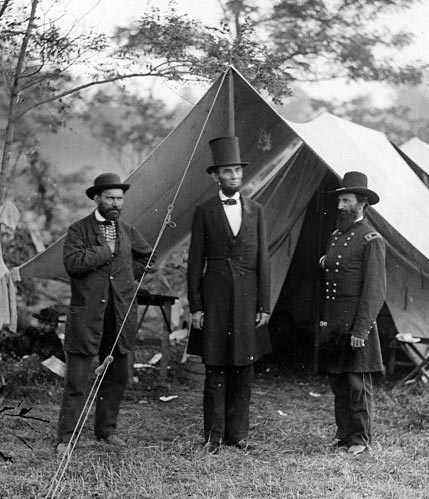
Initially, the war was primarily about the secession of southern states and the survival of the Union, but as the war progressed, Lincoln increasingly made the issue of ending slavery paramount.
On September 22, 1862, Lincoln issued the Emancipation Proclamation that declared the freedom of slaves within the Confederacy.
“… all persons held as slaves within any State or designated part of a State, the people whereof shall then be in rebellion against the United States, shall be then, thenceforward, and forever free” ( Emancipation Proclamation )
The Proclamation came into force on January 1, 1863. Towards the end of the year, many black regiments were raised to help the Union army.
Gettysburg address
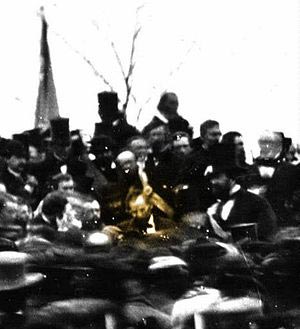
After a difficult opening two years, by 1863, the tide of war started to swing towards the Union forces – helped by the victory at the Battle of Gettysburg in July 1863. Lincoln felt able to redefine the goals of the civil war to include the ending of slavery.
Dedicating the ceremony at Gettysburg on November 19, 1863, Lincoln declared:
“Four score and seven years ago our fathers brought forth on this continent, a new nation, conceived in Liberty, and dedicated to the proposition that all men are created equal. … that we here highly resolve that these dead shall not have died in vain — that this nation, under God, shall have a new birth of freedom — and that government of the people, by the people, for the people, shall not perish from the earth.”
Abraham Lincoln, Gettysburg Address November 19, 1863
Eventually, after four years of attrition, the Federal forces secured the surrender of the defeated south. The union had been saved and the issue of slavery had been brought to a head.
After the Civil War
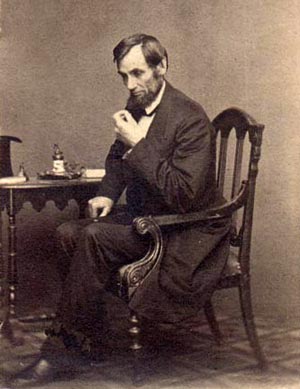
Lincoln 1862
In the aftermath of the civil war, Lincoln sought to reunite the country – offering a generous settlement to the south. When asked how to deal with the southern states, Lincoln replied. “Let ’em up easy.” Lincoln was opposed by more radical factions who wanted greater activism in the south to ensure civil rights for freed slaves.
On January 31, 1865, Lincoln helped pass through Congress a bill to outlaw slavery. The Thirteenth Amendment to the United States Constitution was officially signed into law on December 6, 1865.
Some northern abolitionists and Republicans wanted Lincoln to go further and implement full racial equality on issues of education and voting rights. Lincoln was unwilling to do this (it was a minority political view for the time) Frederick Douglass , a leading black activist (who had escaped from slavery) didn’t always agree with the policies of Lincoln but after meeting Lincoln, he said enthusiastically of the President.
“He treated me as a man; he did not let me feel for a moment that there was any difference in the color of our skins! The President is a most remarkable man. I am satisfied now that he is doing all that circumstances will permit him to do.”
Assassination
Five days after the surrender of Robert E. Lee and the Confederate Army, Lincoln was assassinated by John Wilkes Booth while visiting Ford’s Theatre. Lincoln’s death was widely mourned across the country.
Lincoln is widely regarded as one of America’s most influential and important presidents. As well as saving the Union and promoting Republican values, Lincoln was viewed as embodying the ideals of honesty and integrity.
“Posterity will call you the great emancipator, a more enviable title than any crown could be, and greater than any merely mundane treasure.”
– Giuseppe Garibaldi , 6 August 1863.
“Five score years ago, a great American, in whose symbolic shadow we stand today, signed the Emancipation Proclamation. This momentous decree came as a great beacon light of hope to millions of Negro slaves who had been seared in the flames of withering injustice. It came as a joyous daybreak to end the long night of their captivity.”
Martin Luther King Jr ., “I Have a Dream” speech (28 August 1963), at the Lincoln Memorial
Citation: Pettinger, Tejvan . “Abraham Lincoln Biography ”, Oxford, UK. www.biographyonline.net , 11th Feb 2013. Updated 21st February 2018.
Lincoln – by David Herbert Donald

Lincoln – David Herbert Donald at Amazon
A. Lincoln – a Biography
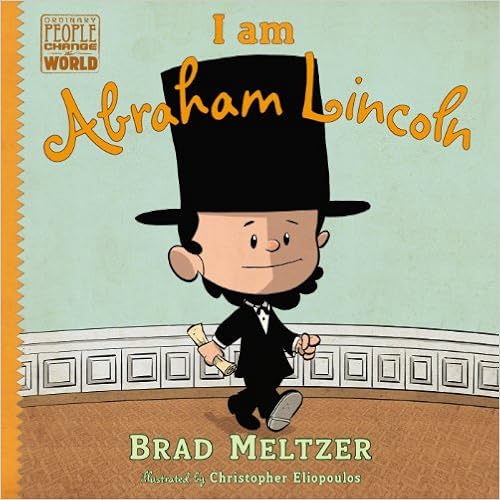
I am Abraham Lincoln by Brad Meltzer at Amazon
Related pages

- People who overcame difficult odds
- Speeches that changed the world
- 100 People who changed the World
External links
- Abraham Lincoln at Congress Guide
- Abraham Lincoln bio

IMAGES
COMMENTS
Feb 12, 2023 · Abraham Lincoln was born on February 12, 1809, in Hodgenville, Kentucky. He was the second son of Thomas and Nancy Lincoln. He was born into a poor family. His mother died when he was nine years old. He self-educated himself into a lawyer. in 1842, Abraham Lincoln married Mary Todd. They married at Springfield, Illinois.
Short Autobiography from 1859 - Part of the Lincoln Timeline at The History Place. Short Autobiography - 1859 I was born Feb. 12, 1809, in Hardin County, Kentucky.
8 ABRAHAMLINCOLN Hesettledinanunbrokenforest, andtheclearingawayofsurplus woodwasthegreattaskahead. Abraham,thoughveryyoung, waslargeforhisage,andhad anaxputintohishandsatonce; andfromthattillwithinhis twenty-thirdyearhewasalmost constantlyhandlingthatmost usefulinstrument— less,of course,inplowingandharvest-ingseasons.AtthisplaceAbra ...
This the last known photograph of Lincoln June 1858. Abraham Lincoln wrote three autobiographies in a two-year period. This first, terse effort was prepared at the request of Charles Lanman, who was compiling the Dictionary of Congress. Born, February 12, 1809, in Hardin County, Kentucky. Education defective. Profession, a lawyer.
3 days ago · Abraham Lincoln Abraham Lincoln, photograph by Anthony Berger of the Mathew Brady Studio, February 9, 1864. (more) Abraham Lincoln (born February 12, 1809, near Hodgenville , Kentucky, U.S.—died April 15, 1865, Washington, D.C.) was the 16th president of the United States (1861–65), who preserved the Union during the American Civil War and ...
The Life of Abraham Lincoln “The Short and Simple Annals of the Poor” “He was Born in Kentucky, Raised in Indiana and Lived in Illinois” Abraham Lincoln’s early years were marked by hardship on the American frontier. He was born in 1809 into a world of subsistence farming. His father, Tom Lincoln, struggled to carve out a
Jul 19, 2005 · The book provides a condensed biography of Abraham Lincoln, focusing on his upbringing, political ascent, and pivotal role as the sixteenth President of the United States. Its likely topic encompasses key events in Lincoln's life, beginning with his early years, shaped by his family's modest background and pioneer lifestyle.
When Abraham Lincoln was elected President in 1860, seven slave states left the Union to form the Confederate States of America, and four more joined when hostilities began between the North and South. A bloody civil war then engulfed the nation as Lincoln vowed to preserve the Union, enforce the laws of the United States, and end the secession.
Abraham Lincoln Biography | Quotes | Facts “With malice toward none; with charity for all; with firmness in the right, as God gives us to see the right, let us strive on to finish the work we are in; to bind up the nation’s wounds…. ” – Abraham Lincoln. Abraham Lincoln was born Feb 12, 1809, in a single-room log cabin, Hardin County ...
Lincoln died the morning after being shot at Ford's Theatre in Washington, D.C Married: Mary Todd Lincoln Children: Robert, Edward, William, Thomas Nickname: Honest Abe Biography: What is Abraham Lincoln most known for? Lincoln is most famous for leading the country during the American Civil War. His leadership in the North helped the country ...